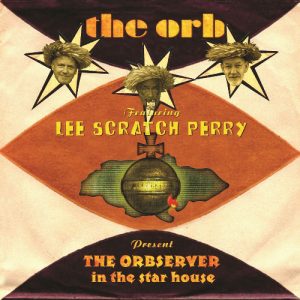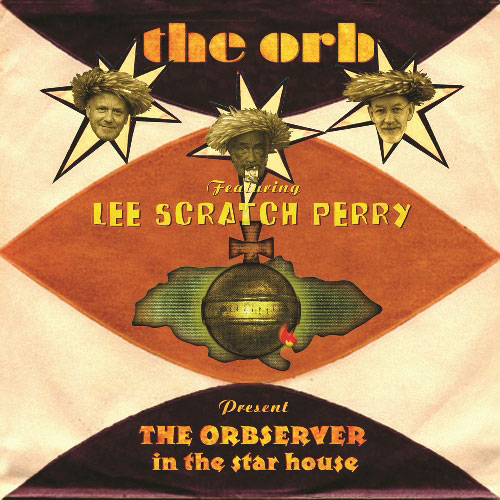 Long time EDM duo, The Orb, has gone through many transformations in its near-twenty year existence, resulting is an unlikely but surprisingly tasteful mixture of the deepest of the German underground scene and the heaviest of old school hip-hop. In its current incarnation, Dr. Alex Paterson and Thomas Felhman make up the duo, and in their newest release off Cooking Vinyl, “THE ORBSERVER in the starhouse,” they’re joined by legendary reggae artist, Lee Scratch Perry, creating a hip-hop, Acid House, neo-reggae monster.
Long time EDM duo, The Orb, has gone through many transformations in its near-twenty year existence, resulting is an unlikely but surprisingly tasteful mixture of the deepest of the German underground scene and the heaviest of old school hip-hop. In its current incarnation, Dr. Alex Paterson and Thomas Felhman make up the duo, and in their newest release off Cooking Vinyl, “THE ORBSERVER in the starhouse,” they’re joined by legendary reggae artist, Lee Scratch Perry, creating a hip-hop, Acid House, neo-reggae monster.
The opening track, “Ball of Fire,” starts with a heavy hip-hop beat and the mysterious vocals of Lee Scratch Perry saying, “I’ve got something to say, I’ve got something to show you.” Fluctuating LFOs, lush piano chords, and a smooth, subtle bass line make tasteful entrances and exits throughout the song. The end reveals a shimmering drone, like wind chimes, behind the music, leading the track to its close.
This track exhibits a refreshing mixture between hip-hop and EDM. More could have been done within the structure; there could have been a deeper atmosphere with more layers of sound, heavier bass, etc. And while the track presents an interesting idea, it’s being approached safely at the moment. My hope is that The Orb takes greater risks with their music as the album progresses.
Track two, “House of the Orbs,” is just as disorienting, hypnotizing, and repetitive as track one, but in the best of ways. Industrial drones give harsh texture to the base of the track, and Perry’s vocals, now drenched in reverb, ramble on about “the universe” and the “house of the stars.” At two minutes, there’s the entrance of an eerie whine that floats ominously behind the music, leaving listeners uneasy without knowing why. The song ends in a static meltdown, drowning the music in high-volume white noise.
This track could’ve used more of an energy build, or at least some kind of direction. I’m not big on the repeating-one-idea-for-seven-minutes type of track, and being that the movement of “House of the Orbs” is driven entirely by the insane ramblings of Perry and not by a diversity of musical ideas, I’d have to, again, label it a cool idea that’s overly safe in execution.
Thankfully track three, “Man in the Moon,” showed some of the diversity I was hoping for. The layered hand drumming, (sounding like djembe and tablas) brings to mind traditional Indian music, while the bass line is groovy, funky, and ugly. Beyond the clash of genre styles, this track departs from its original idea, breaking into a chorus of heavy reversed synths and trumpet blats. And while there are only a few musical elements at play, they intermingle well with one another, creating a very full sound.
And I was glad to discover that track five, “Golden Clouds VS2” kept up with the musical diversity and experimentation found in track three. In fact, the duo uses a dreamy acoustic guitar loop as main element of the song, which is something I’ve never seen done before in an EDM track. At the intro, a sexy female voice asks, “so Mr. Perry, what were the skies like when you were young?” And in typical Perry fashion, he spends the rest of the song answering the question, or maybe not, I don’t know. The drum beat is central to this track, heavy on the snare and the ride, while the bass, only two notes repeated, does a great job coloring the beat. Four minutes reveals one of the first melodies heard on the album, sounding like a delayed electric guitar, making the music cool and jazzy. This track is another of my favorites. It’s original and patient, blends hip hop and jazz, and uses Perry’s voice as a story telling device,, even if the story makes no sense.
Track seven, “Go Down Evil,” is one of the strangest on the album. The intro sounds like snapping of one hundred cello strings, while Perry goes on about human consciousness. The beat is a choppy, funky mess, accented by the occasional guitar chord or bass note. He uses what sounds like a J Dilla sample at three minutes, an airy synth string chorus that pierces the atmosphere, and marries it to a slightly more coherent beat at the base of the music. And while this track was enjoyable, it goes on for too long and doesn’t vary itself enough. But I guess that’s the nature of acid house in a way; it’s more about immersion than variety.
The last track, “Police and Thieves,” seems to be The Orb’s tribute to Perry’s Reggae career. They feature hand drums, a laid-back bass line, and Perry babbling about, “Police and kief, don’t need no police and keif.” At four minutes, the atmosphere grows muddy, bordering on noise with a reggae undertone. He brings in thick, industrial pulses, like pistons alternating in a car engine, and somehow blends it with an unexpected keytar melody and a twangy jaw harp line. Overall, it’s a unique track, but I’m not sure it acts as a great closer. It didn’t leave me feeling like I’d just experienced an album, but rather like I’d just gotten through a really peculiar song. In short, it left me wanting more.
But I’ll go ahead and say it anyway: “The Orb” is a pretty rad album. It took me a while to come to this conclusion, however, as it does have its problems. I’d say the album is strongest when Paterson and Fehlman aren’t afraid to go out an limb and change up the music, when they’re working with heavy bass and drums and using hip hop as their weapon of choice. Furthermore, the vocals of Lee Scratch Perry hold great weight, always going on about some existential, spiritual matter in that crazy-guy-on-the-street type manner. On the other hand, I wish the album didn’t rely so fully on Perry to tie it together. At certain points, I felt like his vocals were used to compensate for a lack of musical diversity. Also, this album is limited by its choice to work mainly within the conventions of Acid House. The music often adheres to the redundant structures of the genre when many of the tracks could be so much more. But on the whole, the grooves on this album are so heavy and so strange that I found it to be unlike most other EDM I’ve heard. A very cool idea is at play, even though it doesn’t always reach its full potential.




